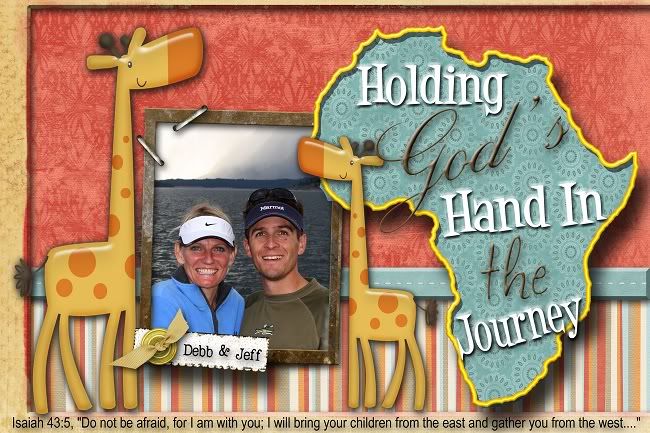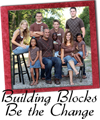Before diving into the Sensory Processing overview, allow me to share a couple more photos from the conference.
Remember the AWESOME women's CREATED FOR CARE Retreat that I went to in Atlanta? And LOVED!!! Well, Andrea, the one who made it all happen was at this EMPOWERED TO CONNECT Conference too! I love how similar our hearts are ~ for our children (children-to-be in my case) as well as for ALL kiddos without families! Susan Hillis was at this conference as well ~ she was an AMAZING speaker at the Created for Care Retreat! So good to see her too! I also got to chat a bit with Andrea's friend, Christy, who also has a heart for children without families!
Sensory Activity helps "orgnaize" the brain. Without this sensory input in early development, a child can become hypersensitive to such input and can easily reach Sensory Overload. Symptoms of such an overload may include: nausea, vomiting, pupil constriction, sweating, change in skin color, dizziness, withdrawal behavior, change in level of arousal.
Here are a couple examples of what an SPD could look like. A young boy may get accidentally bumped while standing in line at school. His brain is unable to process this input correctly; he misinterprets it as getting hit by someone and he hits back. And gets in trouble for what seems, to him, as protecting himself from being hit.
Remember the AWESOME women's CREATED FOR CARE Retreat that I went to in Atlanta? And LOVED!!! Well, Andrea, the one who made it all happen was at this EMPOWERED TO CONNECT Conference too! I love how similar our hearts are ~ for our children (children-to-be in my case) as well as for ALL kiddos without families! Susan Hillis was at this conference as well ~ she was an AMAZING speaker at the Created for Care Retreat! So good to see her too! I also got to chat a bit with Andrea's friend, Christy, who also has a heart for children without families!
Andrea, me, Christy, Jennifer
Oh, and it was so GREAT to have Jeff's mom, Jenni, join us for the Conference! It was fun to have another family member learning right alongside us! Stirred for some great conversations throughout the weekend!
Jeff, me, Jenni (Sattie)
Okay. On to Sensory Processing Disorders (SPD).
Sensory Activity helps "orgnaize" the brain. Without this sensory input in early development, a child can become hypersensitive to such input and can easily reach Sensory Overload. Symptoms of such an overload may include: nausea, vomiting, pupil constriction, sweating, change in skin color, dizziness, withdrawal behavior, change in level of arousal.
Here are a couple examples of what an SPD could look like. A young boy may get accidentally bumped while standing in line at school. His brain is unable to process this input correctly; he misinterprets it as getting hit by someone and he hits back. And gets in trouble for what seems, to him, as protecting himself from being hit.
Indiscriminate Friendliness is also oftentimes a result of a child needing sensory stimulation. Various play activities can provide the needed sensory input for both of these aforementioned examples, such as the crab walk, riding a bike, trips to the park, jumping on a trampoline, playing basketball, creating a "crash and bump" play area.
Another child may find light feathery sensations on his skin bothersome, whereas firm kisses and hugs feel better to him. Yet, how often does he get in trouble for "being too rough".....??????.......To help this child's brain "organize" we can encourage him to reach into buckets of rice to get a toy (that we placed in the rice bucket); allow him to jump in a pool of beans; roll on carpet and various textures.
Deep pressure activities can help calm a sensory overloaded child. Firm hugs; weighted therapy blankets; having the child push into or lean into a solid wall ~ with you doing it to right next to him!
Whatever is your child's sensory need and whatever activity best meets that need, Sensory Processing opportunities, is recommended every two hours. Daily.
When trying to incorporate any/all that is taught in this TRUST-BASED RELATIONSHIP intervention (discussed in the last 3 or 4 posts), remember to "never fix the roof when it is raining." Our children will respond best when they are in a quiet and alert phase. While some of these techniques will help calm an overloaded child, most of the strategies are recommended for a time when our child is quiet yet alert.
The commitment to meeting all of the discussed needs (not just SPD) TODAY pays off not just today, but in the years to come. If we do not put in the time to meet the needs of our children now, the need does not disappear. It only manifests itself in greater form later.
Whatever is your child's sensory need and whatever activity best meets that need, Sensory Processing opportunities, is recommended every two hours. Daily.
When trying to incorporate any/all that is taught in this TRUST-BASED RELATIONSHIP intervention (discussed in the last 3 or 4 posts), remember to "never fix the roof when it is raining." Our children will respond best when they are in a quiet and alert phase. While some of these techniques will help calm an overloaded child, most of the strategies are recommended for a time when our child is quiet yet alert.
The commitment to meeting all of the discussed needs (not just SPD) TODAY pays off not just today, but in the years to come. If we do not put in the time to meet the needs of our children now, the need does not disappear. It only manifests itself in greater form later.
BOTTOM LINE. Our children need us. YES, they need our love. BUT! They also need us to learn more about who they are and where they are coming from and how their early environment effects their brain ~ and behavior. We, as parents, are given the privilege to help re-train their brains.
Dr. Karyn Purvis says, "THERE IS AN ANSWER TO EVERY SITUATION!"
Return tomorrow for a list of resources we were provided during the course! And of course, if ever given the opportunity to attend an EMPOWERED TO CONNECT Convention, Jeff and I say "GO! Don't hesitate! JUST GO!"
{please realize these last 3-4 posts are only a brief overview of the course and I am by no means a professional in this area}



















































2 comments:
Great post mama! So many families don't know anything about SPD..we didn't. Our precious Cana struggled greatly for the first TWO years home until we discovered she had pretty severe SPD!! Let's just say life was literally turned upside down for all of us...it was a very hard time. After lots of OT & PT, she became worse but then the Lord sent us a wonderful Christian Neurodevelopmentalist who assessed our baby girl...we didn't tell her anything about Cana and she pegged her immediately! She sent us home with an in-home therapy program & it's been phenomenal....our baby girl is finally healing! Our girl is still very fragile but the Lord is healing her!
Post a Comment
We Love Your Kind Thoughts!